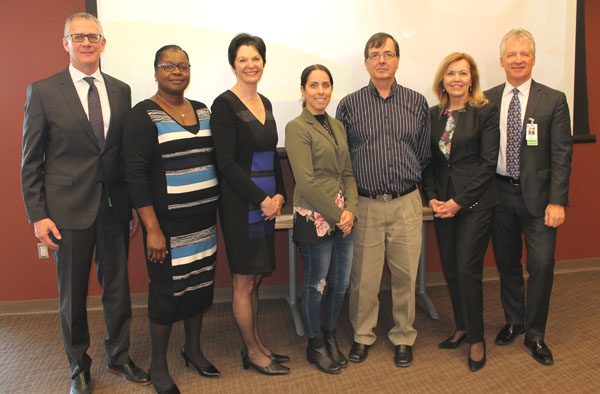Mar 29, 2017 @ 23:00

Earlier today, on the second stop of her visit to the NE LHIN, Patient Ombudsman Christine Elliott is shown at Sault Area Hospital (SAH) above (second from right) with (left to right) Greg Peres, SAH Board Chair; Marie-Claire Muamba, Senior Investigator with the Patient Ombudsman’s office; Cynthia Stables, NE LHIN Senior Director; Vanessa Grisdale, SAH Patient Advisor, Corporate Council; Ron Walker, SAH Patient Advisor, Renal Program Council; and Ron Gagnon, SAH President and CEO.
Ontario’s Patient Ombudsman, Christine Elliott, is visiting the North East Local Health Integration Network (NE LHIN) this week to learn more about patient-centred initiatives taking place in Northeastern Ontario and educate Northerners about the role of the Ombudsman in the patient complaint process.
Hosted by the NE LHIN, Christine Elliott and her team will visit North Bay, Sault Ste. Marie, Espanola and Sudbury this week, and the James and Hudson Bay Coast later this spring. She will meet with health care providers, patients, and the NE LHIN Board of Directors to learn about the many ways Northerners are involved in health care planning and decision-making.
“I appreciate the opportunity to visit the NE LHIN and learn more about the innovative and unique ways patients and caregivers are being involved in healthcare planning across Northeastern Ontario, and how they’re improving the system overall. It’s very important for my office to be as inclusive and accessible as possible, and a large part of that commitment is understanding local healthcare needs and priorities,” said Elliott.
Patients and family members are active participants in several LHIN planning tables, including the NE LHIN Dementia Steering Committee and Regional Mental Health and Addictions Advisory Council, as well as Health Links and Health Hubs. Later this spring, the LHIN will call for Northerners to join a Patient and Family Advisory Council which will be instrumental in guiding the LHIN’s work to improve the patient experience.
“Engagement with fellow Northerners to develop key planning pieces, such as our three-year strategic plan and Aboriginal Heath Care and Reconciliation Action Plan, are the bedrock of our LHIN work to strengthen the Northeastern Ontario health care system,” said Louise Paquette, NE LHIN CEO. “As well, our complaints process and web access point, ensure Northerners’ concerns and comments are heard and responded to around the clock.”
FACTS:
- Christine Elliott officially became Ontario’s first Patient Ombudsman on July 1st, 2016. The role of her office is to receive and respond to complaints from patients and caregivers about public hospitals, long-term care homes and Community Care Access Centres (CCACs) to help meet the needs of people who have tried and not had their concerns fairly resolved through existing complaint mechanisms.
- As a champion for fairness, the Patient Ombudsman’s office tries to facilitate resolutions and investigate complaints about patient care and healthcare experiences and make recommendations to improve experiences for all Ontarians.
- The Patient Ombudsman will provide a report on her activities and recommendations to the Minister of Health and Long-Term Care and to LHINs as appropriate.
- For more information about the Patient Ombudsman’s office, please visit www.patientombudsman.ca
- Over the past five years, more than 8,000 Northerners have been actively involved in NE LHIN health care planning through such ways as: attending a community engagement session, completing surveys and evaluations, writing to the LHIN via the 24/7 email –[email protected], or contacting the LHIN through their Complaints/Compliments/Concernsweb page.
- A Health Link is designed to foster collaboration between health and social service providers to better coordinate care for medically-complex patients. As this group of patients present with multiple health conditions and see a large number of health care providers, Health Link helps them by developing individualized care plans. A Rural Health Hub is designed to improve coordination of care for all people in a given area by bringing all the health care providers together through enhanced partnerships, and providing patients with ready access to a comprehensive list of health care services.
 Wawa-news.com You can't hear the 'big picture'!
Wawa-news.com You can't hear the 'big picture'!

